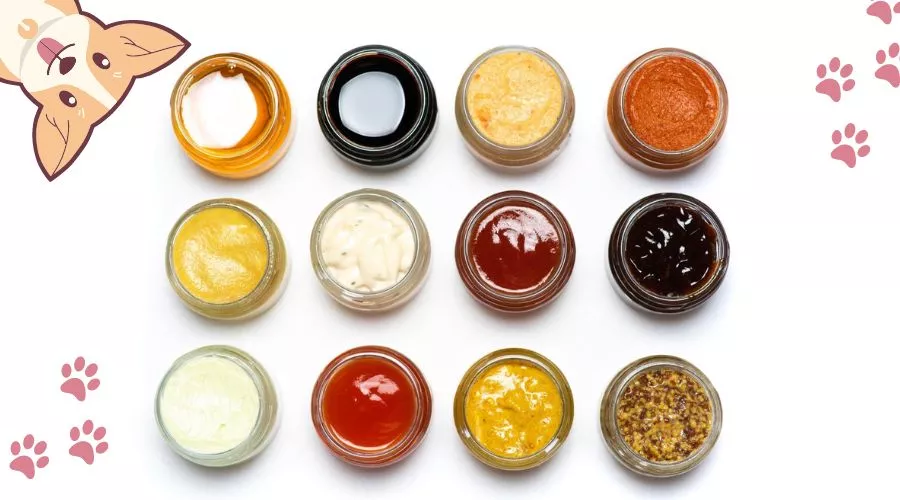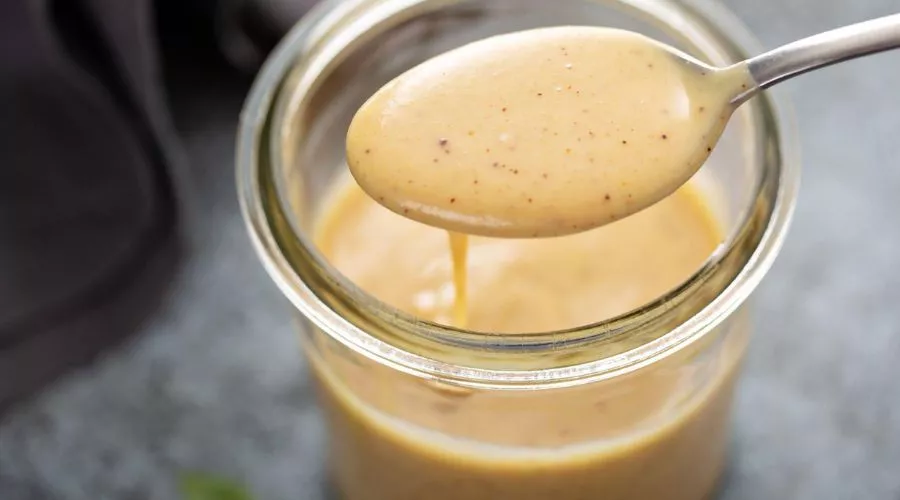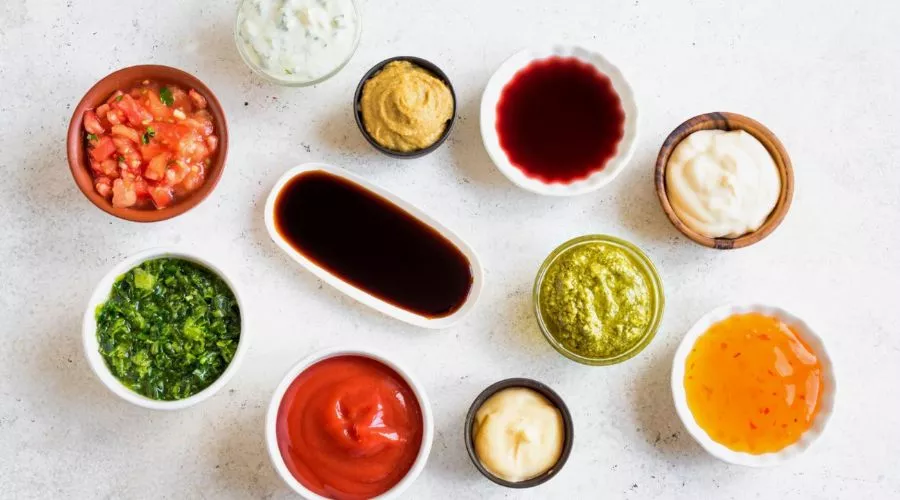Do you have a picky pup at home? Are you looking for ways to make their meals more enjoyable?
Adding sauces to dog food is a great way to mix it up and make mealtimes more exciting for your pup!
Not only can sauces add flavor, but they can also provide valuable nutrients and minerals. From homemade bone broth to store-bought sauces, there are many options available to make your pup’s meals more flavorful.
I’ll explore some of the best sauces you can add to your dog’s food, as well as how to do it safely and effectively.
Read More to learn more about the benefits of adding sauces to dog food, as well as the best sauces for your pup.
What are the benefits of adding sauces to dog food?

There are several benefits of adding sauces to dog food ↗. Perhaps the most important reason is to add flavor.
Pups do not have a very nuanced sense of taste, so they have a much stronger preference for certain textures and flavors than humans do. This means that a pup may find their food extremely bland.
This is especially common with dogs who have lost their teeth, as their sense of taste is greatly diminished. With this in mind, adding a sauce to your pup’s food can help them enjoy their meals a lot more.
Another benefit of adding sauces to dog food is that they can provide additional nutrients and minerals. For example, tomato sauce contains lycopene, which has been shown to have many health benefits, including lowering the risk of certain cancers.
Similarly, peanut butter contains protein, vitamins and minerals that are good for your pup’s health.
Other examples include honey, which is a great source of energy due to its sugar content, and yogurt, which contains probiotics that are good for your pup’s digestive health. With these benefits in mind, it’s clear why adding sauces to dog food is a great way to improve your pup’s health.
How to add sauces to dog food safely and effectively

When adding sauces to dog food, it’s important to do so safely. If you put too much sauce into your pup’s food, it may cause them to choke or get stomach cramps, which may cause your pup to become seriously ill.
Additionally, you don’t want to add something to your pup’s food that may be harmful for them. Dogs have different nutritional needs than humans, so what’s good for us isn’t necessarily good for them.
To add sauces safely to dog food, there are a few things you should keep in mind.
First, try to avoid adding very hot sauces to your pup’s food, as they may cause internal burns. During hot weather, it is especially important to avoid adding hot foods to your pup’s meals, as they may cause your pup to overheat.
Second, make sure to avoid adding anything spicy to your pup’s food, as spicy foods may be harmful for them. Spicier foods may cause gastric distress or diarrhea, both of which are unpleasant for your pup.
Finally, avoid adding very salty foods to your pup’s food, as this may cause dehydration.
The best homemade sauces for dog food

Homemade sauces for dog food make a great addition to your pup’s meals. There are many different types of homemade sauces you can use, each of which provides a different set of nutrients.
One great homemade sauce is bone broth. Bone broth is an excellent source of minerals, and it also contains collagen, which may help with joint pain in pups that are suffering from arthritis. Similarly, vegetable purees make excellent additions to your pup’s food, as they can provide vitamins, minerals and fiber that are beneficial to your pup’s health.
Another homemade sauce you may want to try is yogurt, which contains probiotics that are beneficial to your pup’s digestive health.
Lastly, peanut butter makes a great addition to your pup’s food. Peanut butter is high in protein, making it a great source of energy, and it also contains vitamins and minerals that are good for your pup’s health.
The best store-bought sauces for dog food

While it’s best to make homemade sauces for your pup’s food, there are also a number of great store-bought sauces that you can add to your pup’s meals. One great sauce that you can add to your pup’s food is yogurt.
Yogurt is a great store-bought sauce to add to your pup’s food, as it contains good bacteria that is beneficial to their digestive system.
Similarly, tomato sauce is a great store-bought sauce to add to your pup’s food, as it contains lycopene, which has been shown to have many health benefits. Another great store-bought sauce to add to your pup’s food is peanut butter.
Peanut butter is a great source of protein, and it also contains vitamins and minerals that are good for your pup’s health. Last, but not least, honey is a great store-bought sauce for your pup’s food. Honey is a great source of energy, and it also has antibacterial properties that may help to prevent infections in your pup’s system.
Nutrition facts for sauces

Many of the sauces that you can add to your pup’s food are also delicious to humans. This means that you don’t have to make two separate meals every time you want to add a sauce to your pup’s food.
If you decide to use a sauce that is both human and pup-friendly, keep in mind that the nutritional values of the sauce may be different when used for pups.
Since pups require more nutrients than humans, certain sauces that are great for us may not be as good for our pups. This is especially true of salt and sugar, which are often reduced in pups’ sauces compared to human sauces.
With this in mind, it’s important to read the nutritional information on the sauce you plan to use to make sure it’s good for your pup.
How to choose the right sauce for your pup

Before you start adding a new sauce to your pup’s food, you’ll want to make sure you choose the right one.
First, determine whether the sauce is appropriate for your pup’s age. For example, it’s best to wait until your pup is at least three years old before adding yogurt to their meals.
Also, keep in mind that pups with certain allergies, such as dairy allergies, will likely not be able to consume certain sauces. Next, make sure that the sauce you choose is safe to eat uncooked.
While many sauces are safe to eat raw, some are dangerous to consume uncooked. For example, it’s important to avoid adding raw garlic to your pup’s food, as it may cause them harm.
Once you’ve determined that the sauce is appropriate for your pup and safe to eat uncooked, you can start adding it to your pup’s food.
Tips for adding sauces to dog food
There are a few tips to keep in mind when you’re adding sauces to your pup’s food. First, pay attention to your pup’s reactions to the new sauce. If they seem to like it, great! If not, try a different sauce.
Second, don’t overdo it. While a sauce sprinkled on top of your pup’s food can make a big difference, adding a new sauce to your pup’s food every day may cause them to become sick.
Finally, remember to clean your dog bowl after adding a sauce to your pup’s food. A sauce can leave a sticky residue on the inside of your pup bowl, which may be harmful to their health.
The importance of consulting a veterinarian
Like many other aspects of pet ownership, adding sauces to your pup’s food is something that should be done under the supervision of a veterinarian.
If you’ve never added sauces to your pup’s food before, it’s important to consult a veterinarian first to make sure that it’s safe and healthy for your pup.
Similarly, if you’re adding a new sauce to your pup’s food, it’s also a good idea to consult a veterinarian to make sure it’s good for your pup.
With these two pieces of advice in mind, you can start adding tasty sauces
FAQS
What sauces are OK for dogs?
Broth, gravy, pumpkin puree, and plain chicken or beef broth-based gravy are all safe sauces for dogs. Herbs and spices like anise, basil, chamomile, cinnamon, ginger, parsley, and turmeric are also safe for dogs. However, sauces like ketchup, spaghetti sauce, and anything with added salt, onion, or garlic should be avoided.
What can you add to dog food for flavor?
You can add a variety of foods to dog food for flavor, such as grated carrots, sautéed zucchini, frozen vegetables, ground beef, chicken, turkey or lamb, hard-boiled eggs, crumbled bacon or turkey bacon, canned sardines or mackerel, ground-up liver treats, nori, spirulina, yogurt, fish oil, flax seed oil, organ meats, and peanut butter or fresh blueberries.
What liquid can I mix with dog food?
You can mix warm water, goat’s milk, apple cider vinegar, canned pumpkin, digestive enzymes, freeze-dried raw dog food, raw or lightly steamed veggies, raw or lightly cooked meat or eggs, and PetAg Dyne High-Calorie Liquid Dog Supplement with dog food to improve the rate of digestion and provide additional nutrients.
What can I add to my dogs dry food to make her eat it?
You can add a variety of wholesome ingredients to your dog’s dry food to make it more appealing and nutritious, such as eggs, low-sodium chicken broth, coconut oil, peanut butter, sardines, fresh veggies and fruits, organ meats, digestive enzymes, raw goat’s milk, bone broth, pumpkin, a small amount of wet dog food, boiled vegetables, ground beef, and salmon oil.






